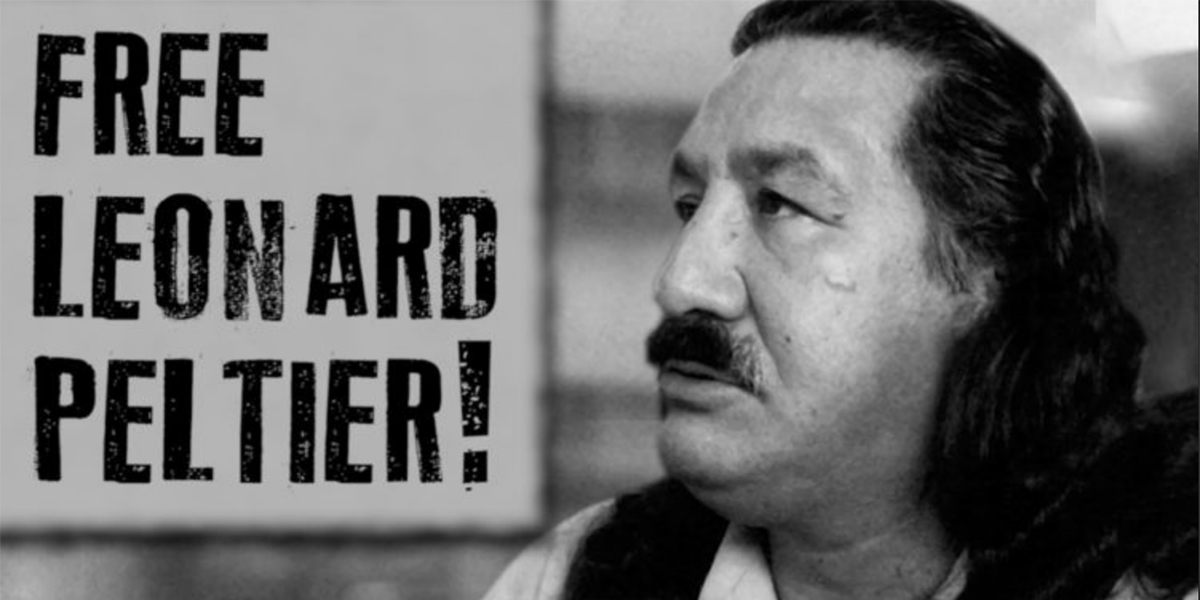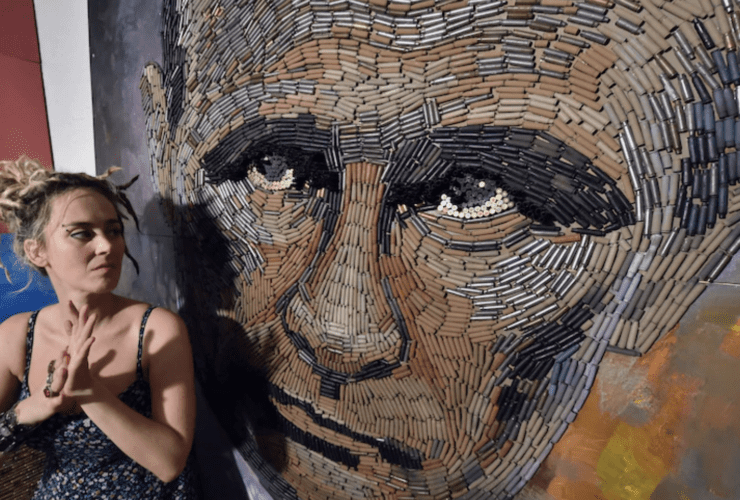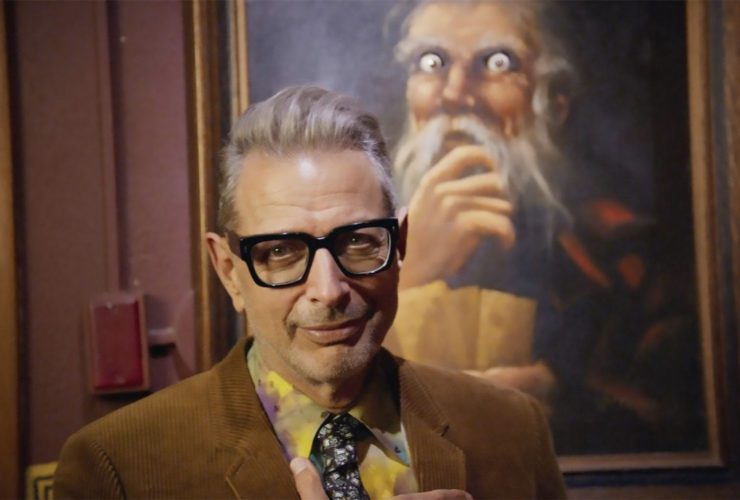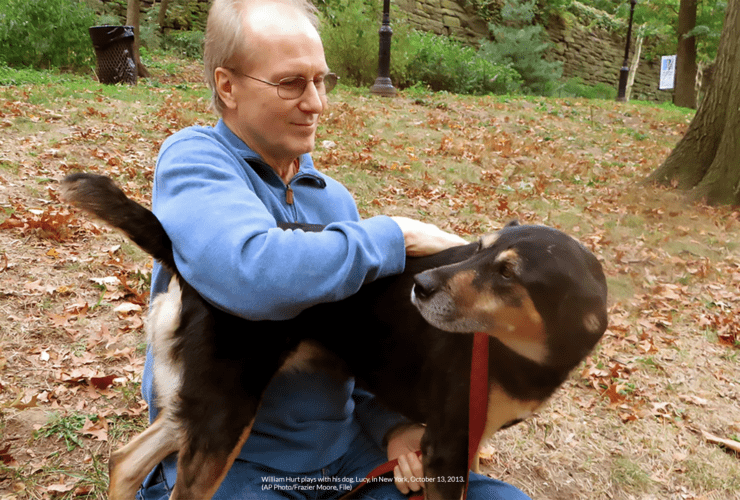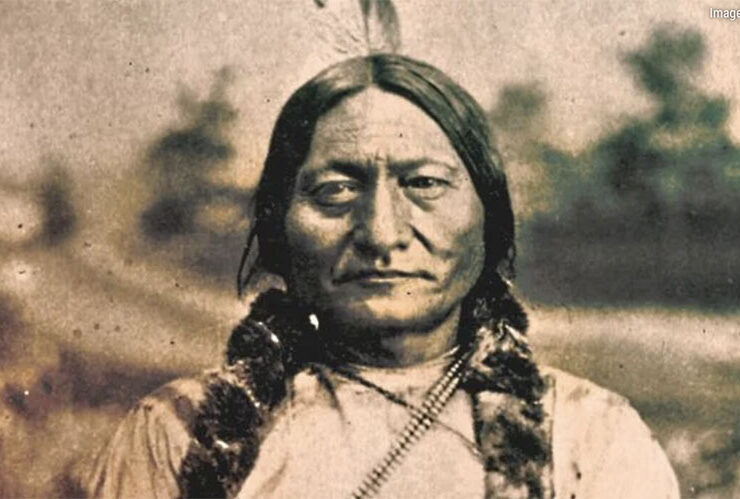Currently serving two consecutive life sentences in Federal Prison
Leonard Peltier was born on September 12, 1944, is an American indigenous rights activist who was convicted of murdering two FBI agents in a June 26, 1975, shooting on the Pine Ridge Reservation in South Dakota. Peltier is an enrolled member of the Turtle Mountain Chippewa, who is also of Lakota and Dakota descent. He is a member of the American Indian Movement (AIM). In a controversial 1977 trial, he was convicted and sentenced to two consecutive terms of life imprisonment for first-degree murder in the shooting of two Federal Bureau of Investigation (FBI) agents during a 1975 shootout on the Pine Ridge Indian Reservation.
Peltier’s indictment and conviction have been the subject of much contention; Amnesty International placed his case under the “Unfair Trials” category of its Annual Report: USA 2010. In his 1999 memoir, Peltier admitted to involvement in the shootout but denied killing the FBI agents.
Peltier is incarcerated at the United States Penitentiary, Coleman in Florida. Peltier became eligible for parole in 1993; his next scheduled parole hearing will be in July 2024, when Peltier will be 79. On January 18, 2017, the Office of the Pardon Attorney announced that President Barack Obama had denied Peltier’s application for clemency. Peltier was next eligible for commutation in 2018. Barring appeals, parole, or presidential clemency, Peltier will remain in prison for the rest of his life.
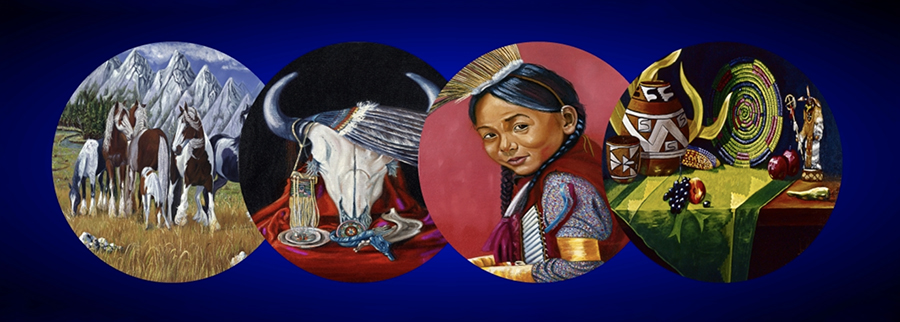
The following interview with Leonard Peltier was conducted by Jane Waide
Mr. Peltier, thank you so much for your time and for the opportunity to interview you. We’d like to first ask you about your Native American heritage and background.
I am an enrolled member of the Turtle Mountain Band of Chippewa Indians—my father’s tribe. My mother was Dakota. I was adopted in the traditional way by a Lakota family, as well as by a First Nation in Canada. Adoption in the Indian way isn’t an honorary thing. It is an honor, of course, but it’s real. I guess you could say I have a very large extended family.
The subjects of your artwork are clear expressions of your cultural background. Has this always been the case?

I have always loved painting my People… or cultural subjects, scenes. I have always believed that we have a very unique culture, and that’s true of all our tribes—from the south to the north. I am particularly fascinated w/the culture of the Aztecs and Mayans. They were so far advanced in many things. No one was sick or when someone did get sick, these ancient cultures knew what herb to use for a cure. They had the best agricultural system in the world. They were practicing brain surgery. They invented the syringe to inject the medicine. Their tools weren’t like those of today, of course. They used the bone of a small hummingbird, sanded it down… and the bladder of a small animal. They ground up the medicines and added water and injected it. So-called modern medicine didn’t use this technique until the 1800s. I recommend that your readers go to Washington, DC, and visit the American Indian museum there. They can see everything I’ve written about here and plenty more. (http://www.nmai.si.edu)
I have always wanted to be an artist… all my life… from day one of school. But, as I said, life for us on those reservations was not a pleasant life and we were lucky to even get through school. I had to quit and find a job at 15 years old; I had finished the 9th grade. Then, I went to work in a potato house at $1.10 an hour, 10 hours a day. Since then, I have earned a GED and some college credits.
I have been painting now on and off for over 35 years.
There are some murals I did in Seattle, at the El Centro de la Raza (I think)… should still be there. I did other things, too. So there are a few pieces of my work out there from over 35 yrs ago.
My art gives me freedom and I love it.
Do you work from photos or drawings and are you currently working on a painting?
 I work from photographs a lot. It’s not like I get to see landscapes, animals. What I’m allowed to see of my own culture, these days is what I see in the photos people send to me.
I work from photographs a lot. It’s not like I get to see landscapes, animals. What I’m allowed to see of my own culture, these days is what I see in the photos people send to me.
Right now, I am working on a painting of a mammoth and a saber tooth tiger for a friend who is working very hard to get me out of here. I recently finished a painting of a horse. I got a lot of oooohs and aaaaahs from my fellow painters here. It’s always gratifying when other artists appreciate my work.
In addition to the proceeds from the sale of your art going directly to your defense fund, we understand that your paintings are sometimes donated to assist in raising funds for other organizations. Please tell us about the causes you have helped to support through these donations.
Yes, I donate paintings to the Defense Committee to help raise funds for my legal defense. The government has unlimited resources, but my defense team has very little money most of the time. The legal work is often very expensive.
Otherwise, people ask for my help all the time and I do what I can. Donating pieces of art is the only way I can help usually. So, my paintings have been donated to women’s shelters and children’s programs. They’re offered for sale or auctioned to help raise funds for those organizations. I’ve also donated to addiction recovery programs and various Indigenous causes. I’ve donated to the Buffalo Field Campaign. Other artists helped me organize an art auction for the Haiti refugees this year. Most of the time all I can do is ask my supporters to get behind various causes. Through the Defense Committee and other organizations, I get supporters to help with an annual gift drive for the kids on Pine Ridge and Turtle Mountain… also to help fund scholarships, donate school supplies… I wish I could do much more.
Are there art supplies you could use that you don’t currently have access to?
I have to purchase my art supplies through my prison commissary account. There are a lot of restrictions here in terms of what supplies I can purchase… even down to which suppliers I can order from. If people want to help, they can contribute to my commissary account. They should contact the Defense Committee to find out how to do that.
 Please tell us about your family, your children and your grandchildren? Are you given the opportunity to see them?
Please tell us about your family, your children and your grandchildren? Are you given the opportunity to see them?
I have 7 grandchildren and 11 great-grandchildren. I have not been able to see/meet most of the great-grandkids, yet. We’re a poor family and we cannot afford many visits—mostly because the government keeps moving me further away from home. Just a week or so ago I visited w/my first cousin who I had not seen for 43 years! Wow, that was a good visit. I got caught up on all of our family news, of course, and learned about the ones who have passed. It was a trip to see someone after such a long time. The last time I saw my cousin he was a teenager. Now, he’s an elder.
What do you desire most for your children?
What I want for my kids, grandchildren and great-grandkids is to have a good life… at least one better than I had. I grew up in a hotbed of racism and hatred. There was total disrespect for Native People and our culture and religion… even our very lives. For us, life was cheap. Back then, if a white person killed a Native and they received prison time they would be considered unlucky. Usually, they got probation… or no negative consequences at all. Our lands would be taken after every new presidential election… some of it would be annexed by the new government.
Have you access to the internet? Besides television, how do you keep abreast of current events and how do you communicate with your attorneys, family, supporters, and the world at large?
I don’t have access to the Internet. I’ve heard a lot about it so, I admit, I’m pretty curious about it. I don’t watch television a great deal, but some. I read a lot. People send me books all the time. Newspapers, of course. Supporters share other material from independent media. I listen to public radio, too.
I get 300 phone minutes a month. That’s how I keep in touch with my family, Committee and attorneys. I have to write letters most often when I want to communicate with friends and supporters. That’s hard too… I have to purchase the paper, pens, envelopes and stamps… also from my commissary account. I don’t keep in touch with as many people as I’d like.
In 1999 your book, Prison Writings: My Life Is My Sundance was released. What does the term Sundance relate to and what is the significance of the title?
The Sundance is a sacred ceremony and a big part of my spiritual belief. I won’t go into a great deal of detail about the ceremony, but I think many people may misunderstand Sundance. Maybe some people think it barbaric or something. Giving flesh as we do in Sundance… To give your flesh to Spirit is to give your life. And what you have given you can no longer lose. Sundance is our strength. It’s my strength. Sundance has made even prison life bearable for me.
Whether pro or con Barack Obama, I think most people would agree that his election marked a historical change, at the very least, in the look of politics. Do you think this change will have any direct effect on your petition for clemency or on the lives of Native Americans in general?
George Bush denied clemency, so there isn’t a petition for clemency at the moment. Supporters have continued to push for clemency, though, based on what’s said in the Constitution. Obama can free me any time he wants.
Gerald Ford was President when I went to prison. Five other men have occupied the Oval Office since then. I know each of them. I have petitioned every one of them for justice. With some, I knew that I had no chance of a fair hearing. With others, I had very high hopes and was disappointed. Obama may be the one. I don’t know. What I do know is that public support for my freedom will make all the difference. Write letters to Obama. Telephone the White House. Make your voices heard.
For those that might be reading about you for the first time, what would you like them to know about you and your life?
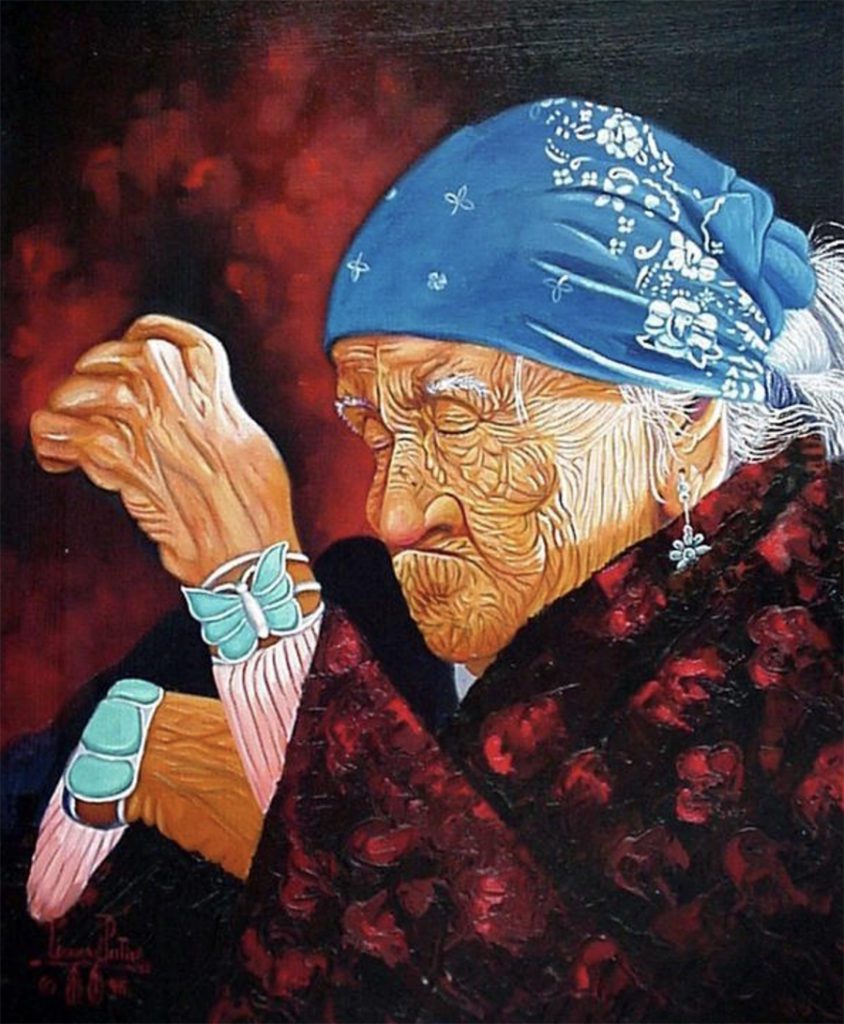 I am an Indian man. All I want is the right to live as one.
I am an Indian man. All I want is the right to live as one.
It would take endless pages to say all I would like to say about the manufactured evidence used against me. Some people have had their convictions overturned because of a single constitutional violation. The number of constitutional violations in my case is staggering. Besides that, I’m innocent. So why am I still here?
You often close your writings and communiqués with the words “In the Spirit of Crazy Horse.” What does this mean to you and why have you chosen this as your signature closing?
Crazy Horse is not only mine, but millions of natives’ hero. We believe his spirit lives in some of us. He was a great warrior and by that I don’t only mean in defense of the People… well, not in a military sense. Crazy Horse was kind, loving, generous, and peaceful. He sacrificed all he had and all he was for the sake of the People… a way of being that we all aspire to.
